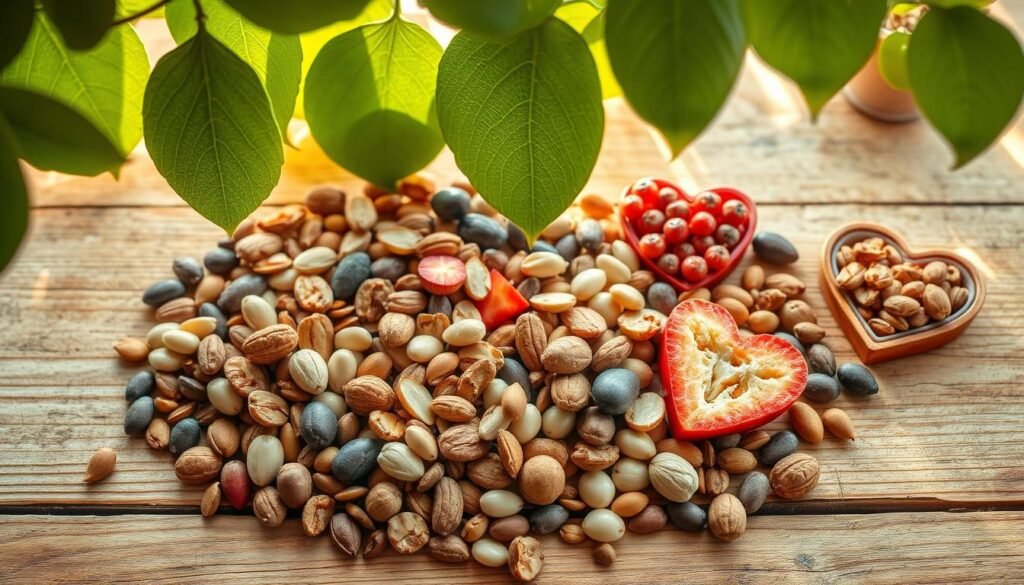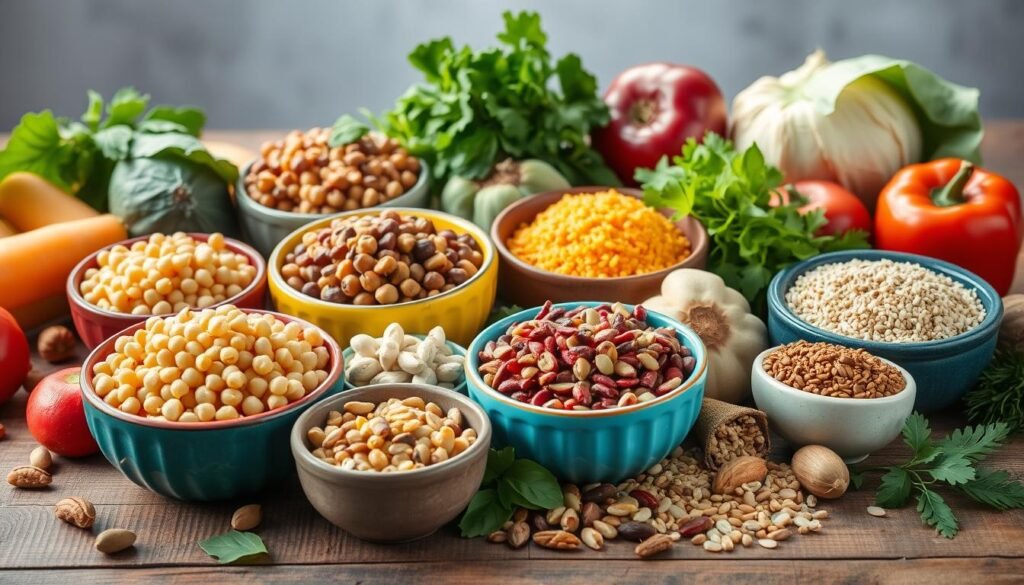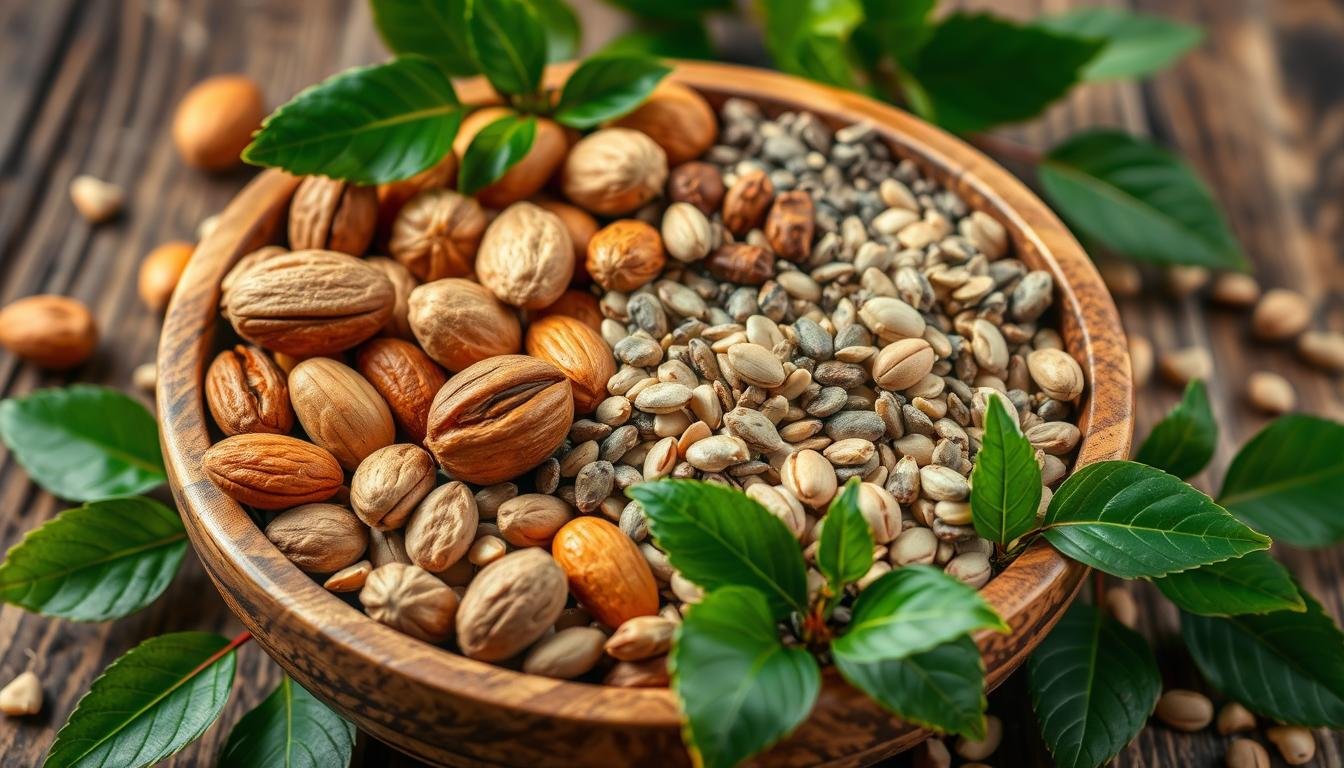Did you know over 463 million people worldwide have diabetes? This number might increase due to obesity and less physical activity. It’s vital to find good ways to manage diabetes, and diet plays a key role. Nuts and seeds are excellent for this. They help control blood sugar and are good for the heart.
Studies show that adding nuts and seeds to your diet can help if you have type 2 diabetes. They are full of omega-3 fatty acids, magnesium, and fiber. Just one ounce of nuts includes healthy fats and important nutrients. These benefits highlight how crucial they are for a healthy diet.
Key Takeaways
- Nuts and seeds are rich in healthy fats and essential nutrients beneficial for blood sugar control.
- Incorporating these foods into meals can enhance heart health and reduce inflammation.
- One ounce of nuts can help manage hunger and provide vital nutrients like magnesium and fiber.
- Regular intake of nuts and seeds can contribute to effective diabetes management and overall well-being.
- A combination of nuts, seeds, and a balanced diet helps mitigate the risks associated with diabetes.
The Nutritional Benefits of Nuts and Seeds
Nuts and seeds are full of nutritional benefits, essential for a healthy diet. They have a lot of healthy fats, like the good fats for your heart. If you have diabetes, eating different nuts and seeds is good for you.
Let’s talk about almonds, walnuts, and pistachios. If you eat an ounce of almonds, that’s about 23 nuts, you get 4 grams of fiber. This helps with digestion and keeps you feeling full. It’s great for keeping your blood sugar steady.
https://www.youtube.com/watch?v=zmcXI0zoPdY
Nuts and seeds are also packed with vitamins and minerals. They’re great for Vitamin E, magnesium, and phosphorus. These help with your metabolism and can help control blood sugar, which is key for people with diabetes. Eating 28 grams of nuts each day can lower your risk of heart disease and death from any cause.
Nuts offer more than just fats. They’re also high in protein. For example, a serving of walnuts has about 4 grams of protein, and peanuts have about 7 grams per serving. Protein helps make your diet satisfying, which is great for managing your weight.
Adding nuts and seeds to your diet is smart if you want to be healthier. They’re especially good for a diabetes diet and can help avoid problems from chronic illnesses. For more details, check out this resource. It has a lot of information on how nuts and seeds are good for your health.
Healthy Fats: The Heart-Saving Properties of Nuts
Nuts are packed with healthy fats, like monounsaturated and polyunsaturated fats. These fats are key for heart health. Studies show that nuts can lower the risk of heart disease and diabetes, especially in women.
Nuts have a lot of fat, 46% to 76% of their weight. For instance, cashews and pistachios have about 46% fat, while macadamias have 76%. Most of this fat is good for you. It helps reduce bad cholesterol and increase good cholesterol. This is great for people with diabetes who have a higher risk of heart disease.

Nuts are good for you, but don’t eat too much. A serving of nuts gives you about 5-10% of your daily fiber need and lots of protein. Nuts are also great for your heart and blood vessels because they have L-arginine. It helps make a heart-healthy chemical called nitric oxide.
| Type of Nut | Total Fat (g per oz) | Protein (g per oz) | Saturated Fat (%) | Fiber (g per oz) |
|---|---|---|---|---|
| Almonds | 14 | 6 | 8 | 3.5 |
| Walnuts | 18 | 4 | 6 | 2 |
| Pine Nuts | 19 | 3.9 | 1.5 | 1.1 |
| Macadamia Nuts | 21 | 2 | 16 | 1.2 |
To get the heart-healthy benefits of nuts, try to eat them regularly. Aim for five servings a week, but watch your calories. Swapping out junk food for nuts can really improve your health. For more tips, check out this resource.
Plant-Based Proteins: A Vital Component for Diabetes Management
Diabetes currently affects around 537 million people worldwide. This makes finding efficient management methods more critical than ever. Plant-based proteins are key in this battle, mainly due to the obesity and type 2 diabetes (T2DM) connection. Nuts and seeds, as protein sources, offer a healthier choice over animal proteins, which often have more saturated fats.
Eating plant-based proteins like almonds and peanuts every day helps control weight. It also has a big role in diabetes management. These proteins give a feeling of fullness which helps keep blood sugar levels stable. This is essential for people working to stay healthy amidst increasing diabetes numbers.
Diets rich in plant proteins help keep muscle mass and energy up for those dealing with diabetes. Including proteins from lentils and legumes improves overall nutrition. This also helps people tackle weight issues linked to diabetes.

Plant-based proteins score high in nutritional value. They’re loaded with fiber and antioxidants but low in bad fats. Such a diet boosts insulin sensitivity and helps manage blood sugar. Individuals facing obesity-related T2DM can greatly benefit from switching to plant-based options.
There’s a rising global interest in plant-based protein products. This reflects a growing awareness of their health and environmental benefits. Choosing these nutritional sources supports a comprehensive diabetes management plan. It boosts health and promotes a sustainable approach to food.
Blood Sugar Control: How Nuts and Seeds Help
Nuts and seeds are vital for blood sugar control. They offer fiber, healthy fats, and nutrients. Foods like almonds, walnuts, and chia seeds help keep blood sugar stable. They make your meals’ glycemic index lower, which is good for blood sugar levels.
Walnuts are great because they have fatty acids that lower bad cholesterol. This is good for people with diabetes, who have a higher risk of heart issues. Pumpkin seeds also help. They have lots of magnesium and fiber. This can help lower your blood sugar after you eat.

Chia seeds are amazing for their antioxidants and omega-3 acids. They lower the risk of diabetes and its problems. Avocados are also good. They have healthy fats but not too many carbs, helping control blood sugar.
Eating nuts with your meals improves your blood sugar response. This helps if you’re managing diabetes. It makes you feel full and stops you from snacking too much. For more info on nuts and blood sugar, check this resource.
Adding these foods to your diet is smart if you have diabetes. They keep your blood sugar stable. Plus, they support your overall health and energy levels.
The Power of Nuts and Seeds: How They Help Manage Diabetes
Nuts and seeds are key in managing diabetes. They are packed with nutrients that help keep glucose levels stable. Almonds and walnuts are especially good for people with diabetes.
Almonds and Their Impact on Glucose Levels
Studies show almonds are great for controlling blood sugar. One study on those with type 2 diabetes showed eating nuts, like almonds, lowers HbA1c levels. This diet reduced blood sugar after meals and provided healthy fats for better overall health.
The Role of Walnuts in Reducing Inflammation
Walnuts fight inflammation, which is great for diabetes care. Chronic inflammation can cause many problems. Eating walnuts helps reduce this risk and supports heart health too. Their healthy fats are key in managing diabetes effectively.
| Nuts/Seeds | Key Benefits | Impact on Glucose Levels | Anti-inflammatory Properties |
|---|---|---|---|
| Almonds | Rich in monounsaturated fats, protein, and fiber | Lower HbA1c levels; control blood sugar after meals | Moderate |
| Walnuts | High in omega-3 fatty acids and antioxidants | Not specifically assessed; overall supportive | Strong |
Dietary Fiber: Essential for Blood Sugar Stability
Dietary fiber is key in keeping blood sugar levels stable. This is especially true for those with diabetes. Studies have shown that eating a lot of fiber lowers the risk of type 2 diabetes. Nuts, seeds, fruits, and vegetables are all great sources of fiber.
Research says that high-fiber diets can reduce fasting blood glucose and HbA1c levels. Soluble fiber, in particular, can also lower bad cholesterol. This is important for heart health in people with diabetes.
The American Diabetes Association recommends getting 25 to 30 grams of fiber every day. This can lead to better blood pressure and lipid profiles. These diet choices can improve overall health for those dealing with diabetes.
Increase fiber intake slowly to avoid stomach issues like bloating. Eating foods high in fiber, like legumes and whole grains, is nutritious and filling. Drinking plenty of water helps fiber work better in your body, easing digestion.
Nuts and seeds help you feel full and can help maintain a healthy weight. Managing weight is very important for people with diabetes. Adding more dietary fiber to your diet can greatly improve your health. It encourages a healthy lifestyle for managing diabetes.
Antioxidants and Their Importance in Diabetes Care
Antioxidants are key in diabetes care. They guard against complications from the disease. They ease oxidative stress that harms health over time. Studies show nuts and seeds are antioxidant-rich. They offer vital nutrients for those with diabetes. Adding these foods to your diet boosts heart health and overall wellness.
Identifying Nuts and Seeds Rich in Antioxidants
Knowing which nuts and seeds have the most antioxidants is crucial. Here’s a list of top choices:
- Almonds: Almonds are full of antioxidants. They help control blood sugar and boost metabolic health.
- Walnuts: Rich in omega-3 and antioxidants, walnuts aid heart health and reduce inflammation linked to diabetes.
- Pistachios: Pistachios have unique antioxidants. They improve glycemic control and may lower heart disease risk.
- Flaxseeds: High in lignan, flaxseeds offer antioxidants that support diabetes care and enhance heart health.
Adding these antioxidant-packed nuts and seeds to meals brings nutritional benefits and supports diabetes care. For more on sugar’s role in controlling blood sugar, visit this resource.
| Nut/Seed | Antioxidant Type | Benefits for Diabetes |
|---|---|---|
| Almonds | Vitamin E, Flavonoids | Improves blood sugar levels, reduces inflammation |
| Walnuts | Polyphenols, Omega-3 | Supports heart health, insulin sensitivity |
| Pistachios | Carotenoids | Enhances glycemic control, heart protection |
| Flaxseeds | Lignans | Regulates blood sugar, heart-health benefits |
Magnesium: A Key Mineral for Diabetic Health
Magnesium is crucial for people with diabetes. It helps with insulin sensitivity and controlling blood sugar. Having the right amount of magnesium makes a big difference for your health.
In research, those with diabetes who took magnesium got better at managing their blood sugar. For instance, 1,000 milligrams of magnesium oxide daily made a significant difference in 30 days. Another group improved their fasting glucose levels by taking 300 milligrams of magnesium chloride for 16 weeks. Eating foods high in magnesium is key for a diet good for diabetes management.
Nuts, like almonds, are full of magnesium. A serving of almonds offers about 80 milligrams. Spinach and pumpkin seeds are also rich in magnesium, with pumpkin seeds having up to 156 milligrams. But, it’s important to watch how much magnesium you consume to avoid taking too much.
How much magnesium you need depends on whether you’re a man or a woman. Women need about 320-360 mg a day, while men need about 410-420 mg. Too much magnesium can be harmful, leading to things like nausea or more serious issues. Those with kidney problems need to be extra careful.
Getting enough magnesium might mean eating the right foods or taking supplements. Sadly, about 48% of people in the U.S. aren’t getting enough magnesium. Adding magnesium-rich foods to your diet is a great way to help your metabolism and diabetes control.
| Food Source | Magnesium Content (mg per Serving) |
|---|---|
| Pumpkin Seeds | 156 mg |
| Chia Seeds | 111 mg |
| Almonds | 80 mg |
| Spinach | 78 mg |
Conclusion
Eating nuts and seeds every day is a great plan for controlling diabetes. These foods are packed with nutrients that keep you healthy. They help manage your blood sugar and are good for your heart.
Studies show nuts and seeds are beneficial. They’re full of healthy fats, fiber, and antioxidants. These elements are key in fighting diabetes. They also guard against heart disease and some cancers.
You can try different nuts and seeds, like almonds and flaxseeds, in your meals. Eating these foods fits well with a plant-based diet. This kind of diet is low in bad fats and high in fiber.
Adding these foods to your diet can improve insulin sensitivity. It can help with weight control and kidney health. Managing diabetes well means watching these areas closely.
Choosing a variety of nuts and seeds helps you manage your diabetes better. Their great taste and variety make eating well fun. It leads to a healthy and enjoyable way of life.


